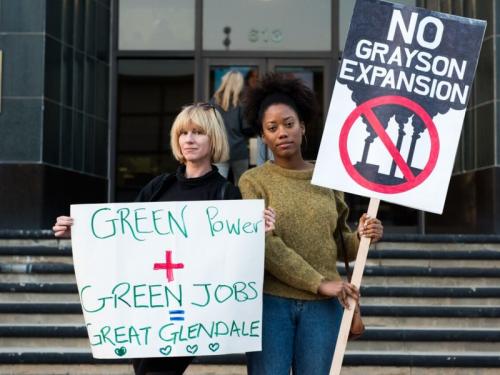Glendale Hits The Brakes On $500 Mil Gas-Fired Power Plant
Glendale joins California’s shift away from gas-fired power, votes to study clean energy options instead of locking themselves into building a dated gas plant
Following heated community cries for clean energy, Glendale City Council hit the brakes on a controversial $500 million gas-fired power plant and decided to study its clean energy options. The vote came after 3am last night in a hearing packed with hundreds of Glendale residents. The Grayson power plant, billed as a repower of an old plant, would have been a dated fossil fuel dinosaur in a clean energy state the day it opened its doors.

Residents protest the $500 million proposed gas plant for their community at a rally before a city hearing.
“Last night Glendale’s City Council made the right decision for local families and the air they breathe,” said Angela Johnson Meszaros, staff attorney at Earthjustice on the Right to Zero campaign. “No community in California wants to see a new gas plant built — those dirty fossil fuel days are behind us. Bring on the clean energy options. They are almost certainly bound to be more affordable than a $500 million dated gas plant.”
Glendale City Council voted 4-1 to pause the $500 million gas-fired plant proposal, opting instead to explore renewable projects. Glendale City Councilmembers Paula Devine, Vartan Gharpetian, and Vrej Agajanian and Mayor Zareh Sinanyan voted to pause the Grayson gas plant. Glendale City Councilmember Ara Najarian was the sole “no” vote.
“We are looking forward to working with the City of Glendale as they study the community’s clean energy options. They made a courageous choice to plan for the future, and not the past, by hitting the brakes on this gas plant proposal,” said Evan Gillespie, director of the Sierra Club’s My Generation Campaign. “Like other California cities, they will likely find that they don’t need a polluting old gas plant in the midst of their community. After all, clean energy is driving gas out of California.”
The Glendale community has been deeply engaged in fighting this 262-megawatt proposed plant, which has included packed hearings with hundreds of concerned residents, heavy participation in the public comment period, letters of opposition to the project from elected leaders in California, and opposition from Glendale’s Armenian community. The gas plant, which would have been built within 1,000 feet of a local elementary school, would worsen Glendale’s air quality and lock the city into fossil fuel power for decades.
The vote last night sets in motion a study the City of Glendale will undertake over the next few months. That includes sending a 90-day Request for Information to clean energy and energy efficiency providers, analyzing their results, and collecting a set of energy solutions. Glendale City Council will then vote to approve an energy solution for the community.
A similar path was charted in Oxnard several weeks ago. The California Energy Commission signaled it would reject the Puente gas plant, sending planners back to the drawing board. Instead of Puente, local energy reliability needs will now be met with clean energy through storage and renewables, and upgrades to the transmission system.
The Solution To Glendale's Energy Problem
Community members and an energy expert have put forth solutions that would deliver clean energy to Glendale instead a dated gas plant.
The plan includes building modern energy storage, using demand-response efficiency measures for the local grid to handle energy usage peaks, and beefing up the city’s rooftop solar.
Gas-Fired Power Plants In Free Fall In California
California has a glut of fossil fuel power plants that is driving up our electricity bills and churning pollution into air already rated the worst in the nation. This, coupled with the heightened resistance from local communities who refuse to become sacrifice zones for new fossil fuel projects, is changing the playbook on gas-fired plants in California.
Fossil fuel companies are hitting roadblocks where they once could overbuild new gas plants and pass along the costs to the local community and ratepayers with ease. Regulators in California are paying attention. On March 22, California energy regulators approved a non-fossil fuel alternative plan to the Puente gas plant on Oxnard’s beach.
“You’re not going to get anywhere if you are just adding more and more gas,” Robert B. Weisenmiller, chairman of the California Energy Commission, told the Wall Street Journal recently. “At some point soon we’ll be permitting the last gas plant in California.”
Over the last several months, proposed gas plants in California have gone down in defeat and existing gas-fired plants are shutting down decades before their expected retirement. NRG recently announced this month that it would shutter three gas-fired plants — Etiwanda in Rancho Cucamonga, Ormond Beach in Oxnard, and Ellwood in Goleta. In December the CA Public Utilities Commission pressed Pacific Gas & Electric to replace another three gas-fired plants with energy storage, shuttering the large Metcalf Energy Center near San Jose, and the Feather River Energy and Yuba City Energy Centers near Yuba City. On March 12, Calpine Corporation requested to suspend its application to build the Mission Rock gas plant in Ventura County, citing shifting policies in California.
Source: Earthjustice
- 233 reads
Human Rights
Ringing FOWPAL’s Peace Bell for the World:Nobel Peace Prize Laureates’ Visions and Actions

Protecting the World’s Cultural Diversity for a Sustainable Future

The Peace Bell Resonates at the 27th Eurasian Economic Summit

Declaration of World Day of the Power of Hope Endorsed by People in 158 Nations

Puppet Show I International Friendship Day 2020

